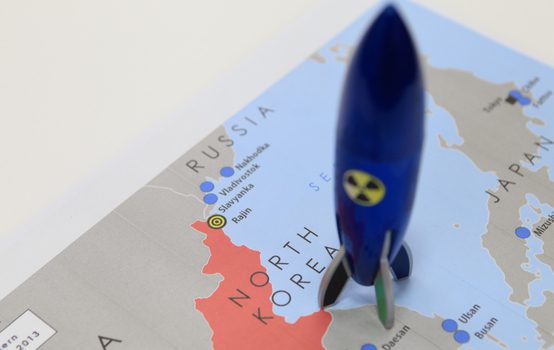Successful Diplomacy with North Korea Requires Compromise

Jeffrey Lewis explains that the proposed summit between Trump and Kim seems to be based on a serious misunderstanding between the two sides:
In other words, Trump seems to have thought that Kim would meet to give up his nuclear weapons. But for Kim the meeting is about being treated as an equal because of his nuclear and missile programs. After all, Saddam Hussein abandoned his weapons and was invaded and hanged. Muammar al-Qaddafi abandoned his and was toppled with the help of American airpower and dragged out of his SUV to a grisly death. Kim Jong Un, by contrast, kept his programs and now is on the verge of a state visit.
The Trump administration now seems to realize this. And so, despite the president personally teasing the announcement, the White House is now saying that no meeting will occur until North Korea takes “concrete steps” toward denuclearizing — a restatement of its previous position.
The Trump administration should absolutely be trying to negotiate with North Korea, but it should not be starting its engagement with the DPRK by having a rushed, slapdash summit based on unrealistic expectations. Supporters of engagement want diplomacy with North Korea to succeed, but that can’t happen without the necessary work and preparation that the Trump administration hasn’t been doing and seems to have no interest in doing. If Trump accepted the meeting because he thought North Korea was about to capitulate, he was badly misinformed. The president has shown great disdain for diplomacy for more than a year, and everything he has done in his dealings with both Iran and North Korea has reflected his contempt for reaching a compromise with adversaries. Why would we think that he has suddenly become open to striking a compromise with Kim?
There is nothing wrong with meeting with an adversary to settle a disputed issue, and it is sometimes necessary in order to complete an agreement in the final stages of negotiations. Successful diplomacy requires giving up on maximalist demands and a willingness to compromise, but it also requires careful preparation and competent execution. These are necessary not only to ensure that the U.S. benefits as much as it can from the negotiation, but also to make sure that any agreement that is made can withstand the intense scrutiny it will inevitably face back home. Holding a summit on short notice when the positions of both sides remain essentially unchanged does not seem likely to lead to an improved relationship and a reduction of tensions, and it makes any tentative deal that might be struck vulnerable to sabotage. It practically guarantees that the summit will be and be seen as a failure, and then both sides will blame each other for that failure. That could very well put us all in a worse position than we were in before the meeting happened.
Victor Cha notes that the danger of holding a high-level meeting of this kind is that it makes conflict more likely if the meeting produces no results:
Finally, everyone should be aware that this dramatic act of diplomacy by these two unusual leaders, who love flair and drama, may also take us closer to war. Failed negotiations at the summit level leave all parties with no other recourse for diplomacy. In which case, as Mr. Trump has said, we really will have “run out of road” on North Korea.
Hard-liners will sometimes feign an interest in diplomatic overtures, but then conduct them in such a provocative way that they can’t succeed. Then they will say that that “diplomacy has failed” because they made sure that it would, and the agitation for military action will start all over again. This is why so many strong supporters of diplomatic engagement with North Korea are worried about the proposed meeting. We are under no illusions that Trump has unexpectedly seen the light and wants to reach a compromise, and so we see a real danger in luring the hotheaded president into a meeting where he thinks he is about to win a great victory when nothing of the sort is going to happen. Lewis continues:
What if Trump’s aides, South Korea, and the rest of us aren’t managing him, but enabling him? I have long advocated a serious diplomatic outreach to North Korea, including one that accepts — if only tacitly — that North Korea will remain a nuclear power for the foreseeable future. But I don’t think that Trump has embraced this strategy. I think everyone around him just wanted him to think he was winning … something. Look at the statements by both South Korea and Japan heaping fawning praise on the “maximum pressure” strategy for eliciting an invitation from Kim. The diplomats in both countries know that is complete BS. But they’ve decided that flattering Trump is a thing that must be done to allow everyone to get on with our lives.
They may think they are pulling one over on Trump, but what happens when he realizes that Kim Jong Un isn’t giving up the bomb?
That is why the administration’s continued insistence on denuclearization is so dangerous. The U.S. has trapped itself by demanding something that North Korea isn’t and won’t be giving up, but the president seems to have accepted the invitation on the misunderstanding that denuclearization is within reach. Unless the administration realizes that denuclearization isn’t happening, a diplomatic solution to the standoff will remain elusive.
Comments